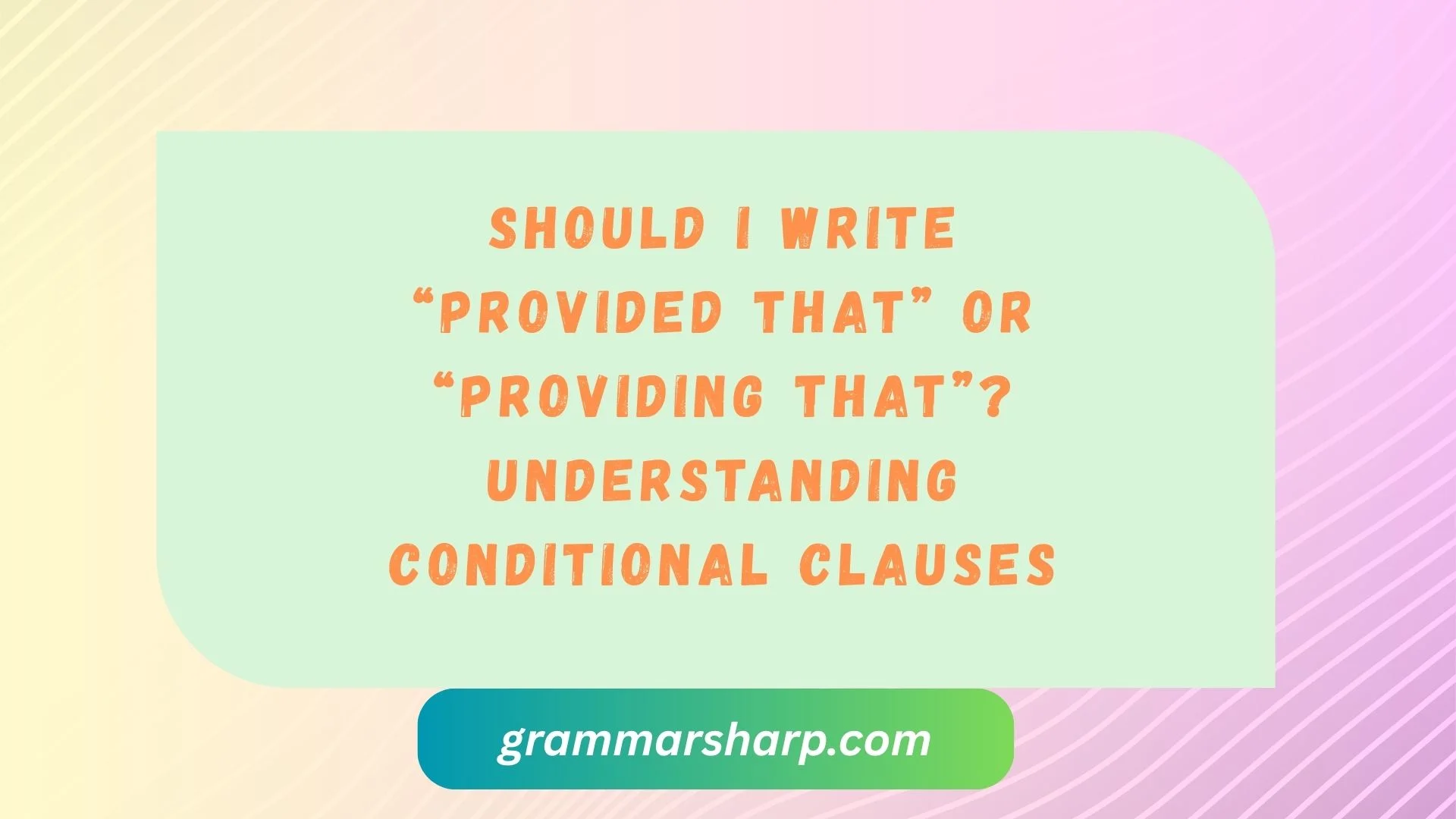Language is full of subtle choices that shape how others interpret your message. Sometimes, the difference comes down to just one word. For example, should you write “provided that” or “providing that”? At first glance, they look almost identical. Yet the choice you make can signal formality, tone, and even authority.
Writers often stumble here, especially when moving between academic, business, and everyday communication. A phrase that feels right in conversation might sound out of place in a research paper. On the other hand, overly stiff wording can make casual writing feel awkward.
That’s why understanding conditional clauses matters. Conditional clauses are those little sentence parts that set conditions for something else to happen. They act like traffic lights for meaning, telling readers when something applies and under what terms. Both “provided that” and “providing that” serve this function, but in slightly different ways.
This article dives deep into the distinction. You’ll learn not only what each phrase means but also when and how to use them correctly. We’ll cover grammar rules, formality levels, common mistakes, alternatives, and even provide comparison tables for quick reference. To make it practical, you’ll also see real-life examples, a simple rule of thumb, and a quick quiz to test your knowledge.
By the end, you’ll never second-guess whether to write “provided that” or “providing that.” Instead, you’ll feel confident tailoring your choice to the right audience and situation.
What Does “Provided That” Mean?
“Provided that” is a conditional phrase meaning “on the condition that” or “if.” It signals that one action or result depends on another happening.
This phrase is common in:
- Legal writing: contracts, policies, regulations
- Academic writing: formal papers, theses, technical discussions
- Professional documents: workplace rules, official instructions
Example Sentences:
- Employees may request flexible hours provided that they maintain weekly productivity targets.
- The policy applies provided that all conditions are met.
- The court may grant bail provided that the defendant surrenders their passport.
Here, “provided that” sets a formal condition. It tells the reader exactly what must happen before something else can occur.
Sentence Diagram (Structure):
Example:
You can access the library provided that you show your ID.
What Does “Providing That” Mean?
“Providing that” also means “if” or “as long as,” but it carries a slightly less formal tone. You’ll hear it more in casual conversation, workplace dialogue, and everyday writing.
Example Sentences:
- We’ll go hiking tomorrow, providing that it doesn’t rain.
- You can borrow my laptop, providing that you bring it back by Friday.
- She’ll join the meeting, providing that the time works for her.
Compared to “provided that,” this version feels friendlier and less rigid. You could replace it with “as long as” in most sentences without changing the meaning.
Key Differences Between “Provided That” and “Providing That”
Although the phrases are interchangeable in many situations, subtle differences matter.
| Aspect | Provided That | Providing That |
| Formality | More formal; suited to academic/legal use | Less formal; suited to casual or everyday use |
| Tone | Authoritative, precise | Conversational, relaxed |
| Usage | Contracts, rules, academic writing | Emails, speech, general writing |
| Interchangeable? | Sometimes, but formal contexts favor it | Works in informal contexts |
Quick takeaway: Use “provided that” when you need authority. Use “providing that” when you want a softer, conversational feel.
Grammar Behind Conditional Clauses

Before diving deeper, let’s zoom out. Both phrases belong to the family of conditional clauses.
A conditional clause sets a requirement for the main clause. Think of it like a contract between two parts of a sentence.
Types of Conditionals:
- Zero Conditional: If you heat water, it boils.
- First Conditional: If it rains, we’ll cancel the trip.
- Second Conditional: If I had a car, I would drive to work.
- Third Conditional: If she had studied, she would have passed.
“Provided that” and “providing that” generally work like first conditionals. They describe real possibilities, not hypothetical or impossible ones.
Placement in a Sentence:
- Beginning: Provided that you agree, we’ll move forward.
- Middle: We’ll move forward, provided that you agree.
Both placements are grammatically correct. The choice often depends on flow and emphasis.
When to Use “Provided That”
Use “provided that” when you need to sound professional, serious, or precise.
Ideal Contexts:
- Legal writing: The license remains valid provided that all fees are paid.
- Academic essays: The theory holds true provided that external factors are controlled.
- Policy documents: Staff may take leave provided that proper notice is given.
Comparison with “If”:
- Formal: The court may dismiss the case, provided that conditions are satisfied.
- Informal: The court may dismiss the case, if conditions are satisfied.
Notice how “if” works, but “provided that” feels sharper and more authoritative.
When to Use “Providing That”
Use “providing that” in informal or conversational writing. It softens the tone and sounds natural in speech
Ideal Contexts:
- Everyday speech: We’ll leave early, providing that traffic isn’t bad.
- Creative writing: She agreed to the deal, providing that he kept his promise.
- Friendly instructions: You can play outside, providing that you finish your homework.
Compared to “if,” “providing that” feels slightly more formal but still approachable.
Common Mistakes to Avoid
Even advanced writers sometimes misuse these phrases. Here are pitfalls to watch out for:
- Mixing tone: Using “providing that” in a legal contract (too casual).
- Overcomplicating: Writing “providing that if” (redundant).
- Overuse: Replacing every “if” with these phrases (unnecessary).
Pro tip: When in doubt, keep it simple. If “if” works, use it. Save “provided that” for precision and “providing that” for flow.
Alternatives to “Provided That” and “Providing That”
Sometimes, neither phrase fits. Luckily, English has plenty of alternatives.
| Alternative | Meaning | Formality Level | Example |
| If | Condition, possibility | Neutral | You’ll succeed if you work hard. |
| As long as | On condition that | Neutral-casual | You can stay as long as you’re quiet. |
| On condition that | Strict requirement | Formal | Loan approved on condition that documents are valid. |
| Assuming that | Hypothetical basis | Neutral | Assuming that she agrees, we’ll proceed. |
Each has a slightly different shade of meaning, so choose carefully depending on tone.
Which One Should You Use? (Rule of Thumb)
Here’s a simple decision guide:
- Writing formally (contracts, research, policy)? → Use “provided that.”
- Writing informally (emails, conversations, fiction)? → Use “providing that.”
Quick Flowchart:
This keeps your writing clear, precise, and audience-appropriate.
Real-Life Examples from Different Contexts
- Business: You may receive a bonus provided that you meet your targets.
- Casual: We’ll go hiking tomorrow, providing that it doesn’t rain.
- Academic: The theory applies, provided that external conditions are stable.
- Everyday conversation: You can borrow my book, providing that you return it.
Notice how the choice shifts tone and formality.
Quick Quiz to Test Yourself
Try these to see if you’ve mastered the difference:
- You may attend the event, _______ you RSVP by Friday.
a) provided that
b) providing that
c) either works
- We’ll watch the game at your place, _______ you have enough snacks.
a) provided that
b) providing that
c) only “if” works
- The license remains valid, _______ the annual fee is paid.
a) provided that
b) providing that
Conclusion
Both “provided that” and “providing that” serve as conditional phrases meaning “if.” The difference lies in tone and formality. Use “provided that” when you need precision in legal, academic, or professional contexts. Use “providing that” when you want a softer, conversational style.
A simple rule of thumb keeps it clear: formal → provided that, informal → providing that. With this understanding, you’ll avoid common mistakes and choose the right phrase for every context.
FAQs
Is “providing that” grammatically correct?
Yes. It’s widely accepted in informal and conversational English.
Can I replace both with “if”?
Often, yes. But “if” may sound too casual in formal contexts.
Which is more common in British vs American English?
Both are used in both dialects, but “providing that” appears slightly more often in British English.
Is “provided that” too formal for casual writing
Yes, it can sound stiff in everyday conversation. Use “providing that” instead.
Are there cases where both can be used interchangeably?
Yes. In neutral contexts, either works without changing meaning.

